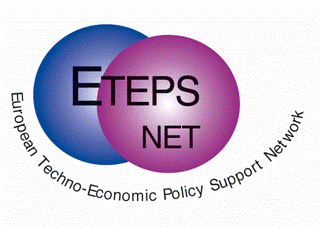In addressing the need expressed by DG INFSO over a foresight-based intelligence building, IPTS proposed researching European Perspectives on the Information Society (EPIS). The aim of this multi-project activity is to develop a foresight exercise investigating the potential evolution of technology, innovation and business with a focus on ICT and identifying potential disruptions for the coming decade.
EPIS will attempt to provide a prospective view on the potential evolution of technologies and applications in relation to ICT. It will achieve this by assessing future technological trends and challenges relevant to ICT in this area, both from the supply and demand side and at technological and market/application levels. The project will also focus on potential disruptions in this area. It will aim at highlighting hot issues, identifying fast emerging, important technological and business topics in order to draw the attention of policy makers on unexpected trends and major changes, which may happen in the coming years. Besides its view on the general development of ICT, EPIS is focusing on certain thematic sectors. For the first year of EPIS the creative content sector has been chosen as the focal theme of investigation.
The EPIS study is structured into the following main tasks: (1) Developing an observatory of trends in technology and business evolutions of ICT, (2) running European foresight exercises on the Creative Content sector and (3) to derive policy-oriented recommendations for DG INFSO / IST Advisory Group.
Status
Completed project (11/2006-01/2008)
Client
European Commission, Joint Research Centers, Institute for Prospective Technological Studies (IPTS)
Partners
- ARC system research GmbH
- AT Research Center Karlsruhe
- Institute for Technology Assessment and Systems Analysis DE University of Sussex
- Science Policy Research Unit (SPRU), UK
Publication
Official deliverables
- Friedewald, Michael, Jürgen von Oertzen, and Kerstin Cuhls, “European Perspectives on the Information Society: Delphi Report”, EPIS Deliverable 2.3.1, European Techno-Economic Policy Support Network (ETEPS), 2007. http://epis.jrc.es/documents/Deliverables/EPIS%202-3-1%20Delphi%20Report.pdf
- Dachs, Bernhard, and K. Matthias Weber, “ICT and the Offshoring of Services”, in Ioannis Maghiros, Fabienne Abadie, and Corina Pascu (eds.), European Perspectives on the Information Society: Annual Monitoring Synthesis and Emerging Trend Updates, Office for Official Publications of the European Communities, Luxembourg, 2008, pp. 193-236.
- Friedewald, Michael, Clemens Cremer, and K. Matthias Weber, “The Role of ICTs as Enabler for Energy Efficiency”, in Ioannis Maghiros, Fabienne Abadie, and Corina Pascu (eds.), European Perspectives on the Information Society: Annual Monitoring Synthesis and Emerging Trend Updates, Office for Official Publications of the European Communities, Luxembourg, 2008, pp. 237-267.
- Friedewald, Michael, Ralf Lindner, and K. Matthias Weber, “ICT tools and services in intelligent domestic and personal environments”, in Ioannis Maghiros, Fabienne Abadie, and Corina Pascu (eds.), European Perspectives on the Information Society: Annual Monitoring Synthesis and Emerging Trend Updates, Office for Official Publications of the European Communities, Luxembourg, 2008, pp. 269-297.
- Maghiros, Ioannis, Fabienne Abadie, and Corina Pascu (eds.), European Perspectives on the Information Society: Annual Monitoring Synthesis and Emerging Trend Updates, Office for Official Publications of the European Communities, Luxembourg, 2008.
- Mateos-Garcia, Juan, Aldo Geuna, and W. Edward Steinmueller, “The State of The Art of The Creative Content Industries in Europe”, EPIS Deliverable 2.2.1, European Techno-Economic Policy Support Network (ETEPS), 2007. http://epis.jrc.ec.europa.eu/
- Mateos-Garcia, Juan, Aldo Geuna, W. Edward Steinmueller, and Georgina S. Voss, “Market Demand Issues and their Impact on ICT innovation in the European Creative Content Sector”, EPIS Deliverable 2.2.3, European Techno-Economic Policy Support Network (ETEPS), 2007. http://epis.jrc.ec.europa.eu/
- Mateos-Garcia, Juan, W. Edward Steinmueller, and Aldo Geuna, “The Impact of ICT Innovations on the Future of the European Creative Content Sector”, EPIS Deliverable 2.2.2, European Techno-Economic Policy Support Network (ETEPS), 2007. http://epis.jrc.ec.europa.eu
- Friedewald, Michael, Matthias Weber, Juan Mateos-Garcia, Aldo Geuna, W. Edward Steinmueller, Michael Rader, Knud Böhle, Gill Ringland, Jan Bierhoff, Ioannis Maghiros, Fabienne Abadie, and Corina Pascu, “The Creative Content Sector: Scenarios for the future & policy implications”, Unpublished EPIS Deliverable 2.4, European Commission, Institute for Prospective Technological Studies, Seville, 2008.
Articles
- Abadie, Fabienne, Michael Friedewald, and K. Matthias Weber, “Adaptive Foresight in the Creative Content Industries: Anticipating Value Chain Transformations and Need for Policy Action”, in Xabier Goenaga Beldarrain, Paul Desruelle, Timo-Topias Totti Könnölä, Cristiano Cagnin, and Karel Hagemann (eds.), The 3rd International Seville Conference on Future-Oriented Technology Analysis. Impacts and Implications for Policy and Decision Making. Book of Abstracts, Office for Official Publications of the European Communities, Luxembourg, 2008, pp. 145-146.
- Abadie, Fabienne, Michael Friedewald, and K. Matthias Weber, “Adaptive foresight in the creative content industries: anticipating value chain transformations and need for policy action”, Science and public policy, Vol. 37, No. 1, 2010, pp. 19-30.




